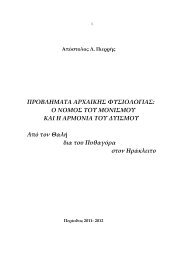APPENDIX C΄ ON DEPILATION: BODY COSMETICS IN CLASSICAL ...
APPENDIX C΄ ON DEPILATION: BODY COSMETICS IN CLASSICAL ...
APPENDIX C΄ ON DEPILATION: BODY COSMETICS IN CLASSICAL ...
Create successful ePaper yourself
Turn your PDF publications into a flip-book with our unique Google optimized e-Paper software.
598 <strong>APPENDIX</strong> <strong>C΄</strong><br />
friends characterologically must be both willing and determined to<br />
share in the inflinction of the punishment unless their enjoyment is<br />
spoilt by an objective circumstance which renders their resolve<br />
pointless (see my interpretation). Dübner (adnotatio ad scholium)<br />
reports that Claudius Puteanus’ apographum scholiorum has: Âå ÌbÓ<br />
ÔsÓ ÙȘ ôÏÏË, ‰ËÏÔÓfiÙÈ, Á˘Ó‹, öÛÙÈ ÙÔÜÙÔ ¬appleÂÚ Ï¤Áˆ appleÔÈÉÛ·È , Âå ‰’ Ôé Ì‹, ìÌÂÖ˜ ·éÙ·› (sc. will do it). (I supplied as obviously required by the sense). And this is the vulgate<br />
interpretation. But as I observed above, everything is all right with the<br />
vulgate understanding apart from the perplexing fact of the àappleÔÛÈÒappleËÛȘ.<br />
Why on earth should the àapplefi‰ÔÛȘ be withheld on such an<br />
interpretation? And besides, which are the two groups implied by<br />
ìÌÂÖ˜ on the one hand and that group of women from which the Ù›˜<br />
may be prepared to help in doing or to do completely on her own the<br />
work envisaged? The women on the scene and the chorus respectively,<br />
one may say. But why one single woman on the one hand and quite a<br />
number on the other helped by slaves? Is it then a man who is<br />
searched out to perform the job (cf. Hermann s emendation above)?<br />
But, apart from everything else, even a man could not alone inflict<br />
such punishment except on a willing subject, which is impossible here.<br />
To conclude this analysis: there is no naturally satisfying result in<br />
these endeavours. Suppose, then, striking a different line, that the<br />
sense was: “if she (i.e. Mnesilochus disguised) despite her age (for<br />
Mnesilochus is an older man) is one of those you know, then let her<br />
escape our vengeance, especially since in such a case her motivation in<br />
saying what she said (condemning the women) will be apparent (i.e.<br />
she judges about all of us from herself) and, furthermore, the<br />
particular form our vengeance would take (depilating her privy parts)<br />
cannot be exacted since she herself keeps clear the area of hair given<br />
her manner of life; but if not (and she therefore has not got a smooth<br />
and hairless pudendum), then let us teach her a lesson not to take the<br />
wrong side by etc.” I think this gives the passage a sense both fitting to<br />
the context as regards meaning, and natural in itself respecting the<br />
interpretation of the Greek. Aristophanes, as usual, plays on many<br />
tableaux simultaneously: if she is one, i.e. one of those she condemns<br />
in speech, her hypocrisy will be unveiled; if not we shall make her<br />
appear as a sexually-prone hag. But also: if she is one, i.e. if she is<br />
somebody, and not a prudish nothing, if she is properly conscious of










